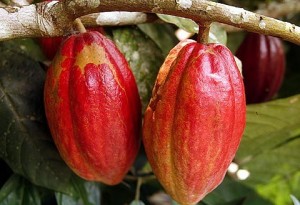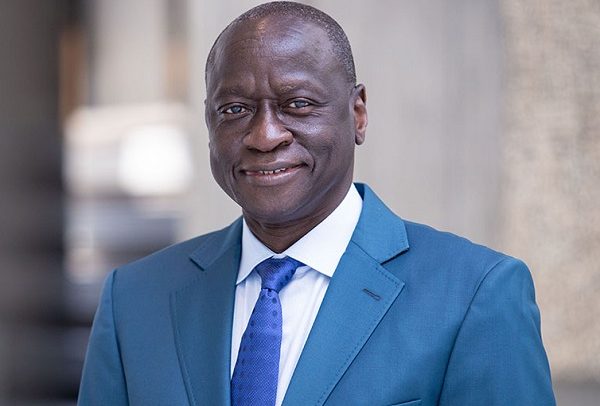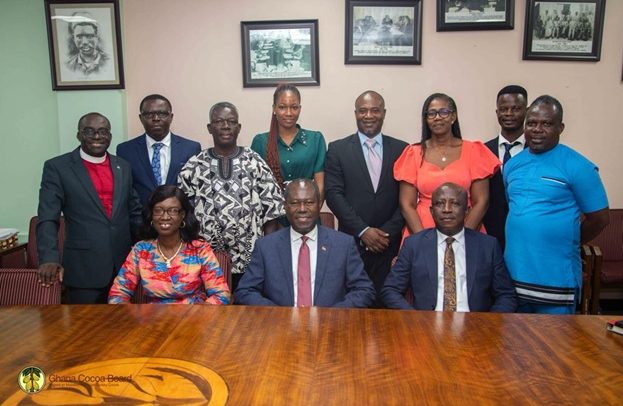

 The Ghana Cocoa Board (COCOBOD) has secured a $100 million financing facility from the World Bank to rehabilitate old farms across six cocoa growing districts in the country.
The Ghana Cocoa Board (COCOBOD) has secured a $100 million financing facility from the World Bank to rehabilitate old farms across six cocoa growing districts in the country.
The beneficiary cocoa growing districts of the project include Assin Fosu, New Edubiase, Nkawkaw, and Juaso.
The four-year project would support the cutting down of cocoa trees, which have lived 20 years and above, land preparations, and the provision of planting materials, including seedlings and suckers.
Mr Joseph Boahen Aidoo, Chief Executive Officer (CEO), COCOBOD, made this disclosure in an interview with journalists as part of a field trip to some farms in Assin Fosu in the Central Region on Thursday, July 4, 2024.
The visit was to assess the work of extension officers, and government interventions to farmers, while educating and sensitising them on best practices to increase cocoa yields.
He explained that though the trees that would be cut down were not diseased, they had outlived their lifespan, with some being more than 30 years, making them become ‘Moribund’ trees.
“Once cocoa hits 20 years and above, it has spent its life span, and from that stage, you realise that it bears no fruits, no pods, and the flowers don’t come, yet the farmer would be maintaining such a farm, and this is not productive,” he said.
That, Boahen Aidoo said required rehabilitation, which once done, would help rejuvenate the farms, leading to increased iproduction.
He stated that COCOBOD would support the beneficiary farmers with plantain suckers, labour for planting, and provide them with extension officers to educate and assist them with the management of their farms for optimum yields.
He noted that should the farmers be provided with seedlings without any other assistance, it would be difficult for them to do the work on their respective farms and achieve the expected outcome.
“We went to one farm, and they were doing 30 hectares. If you cut the trees from this 30-hectare land, and you want the farmer to provide plantain suckers within one year, they cannot. That’s why we’re supporting them,” he said.
He noted that Ghana had implemented a similar project with support from the African Development Bank (AfDB) under the Cocoa Rehabilitation Programme, which focused on ending Cocoa Swollen Shoot Virus Disease (CSSVD).
During the field visit and durbar, farmers called on the government to expedite efforts in constructing roads in cocoa growing areas to support carting of produce after harvesting and reduce post-harvest losses.
They also called for more extension officers, noting that the training and assistance provided by the officers had been helpful in their farming activities.
Nana Kweku Appotoi IV, Aboabohene, Assin Nyankomase, bemoaned the deplorable roads in almost all cocoa growing communities in Assin Fosu, urging COCOBOD to spearhead actions to put the roads in shape.
While committing to ensuring that cocoa farms were not taken over by illegal miners, he urged the farmers to adhere to best practices, and extend the knowledge received to farmers who could not attend the event.
Addressing the concerns of farmers, Boahen Aidoo said the government, following the hikes in cocoa prices, would see to the allocation of funds to fix deplorable roads in cocoa growing communities.
He advised farmers not to grow cocoa in sandy and clay soils, stop burning weeds, and selling branches of cocoa trees to be used as firewood, instead, leave them on their farms to serve as mulch.
He also cautioned them against the use of harmful weedicides, like ‘round up,’ and glyphosate (commonly known as ‘condemn’) and use materials like poultry manure on their farms.
The weedicides, he said, contained acid and other chemicals, which were harmful to the cocoa and other plants, killed microorganisms and made soils to lose their essential nutrients, thereby, reducing crop yields.
On their part, the COCOBOD CEO said, since 2020 they had procured about 100,000 motorized slashers and pruners, to help clear cocoa farms, and increase production, urging farmers to access them from various district offices.
Regarding extension officers, he said COCOBOD had increased the officers-to-farmers ration from the previously one-to-three thousand to one-to-600, almost meeting the Food and Agriculture Organisation’s (FAO) international standard of one extension officer-to-500 farmers.
Source: GNA
The post COCOBOD secures $100m World Bank support for cocoa rehabilitation appeared first on Ghana Business News.
Read Full Story











Facebook
Twitter
Pinterest
Instagram
Google+
YouTube
LinkedIn
RSS